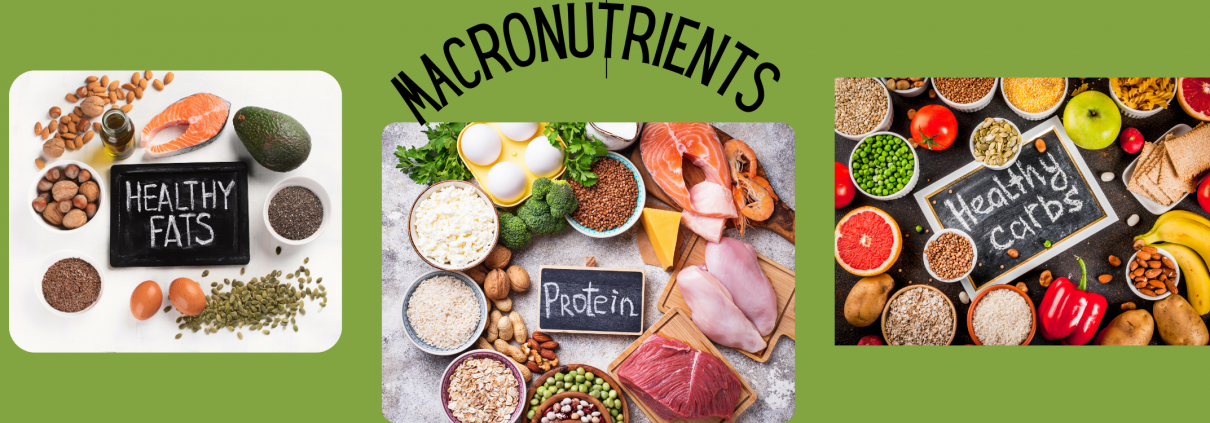Harnessing the Power of Macronutrients: Fats, Protein, Carbohydrates
Fueling Your Body, Optimizing Your Health:
In the quest for optimal health and fitness, understanding and strategically utilizing macronutrients – the fundamental building blocks of our nutrition (protein, carbohydrates, and fats) – is paramount. Shifting our focus from mere calorie counting to targeted macronutrient choices tailored to our goals unlocks a new level of health and performance. Let’s delve into the world of macros and explore how they can empower you!
1. Protein: The Cornerstone of Muscle Growth and More
Protein isn’t just for bodybuilders; it’s a crucial element for anyone striving for fitness and vitality. It supports:
- Muscle growth and repair: Builds and maintains lean muscle mass, aiding in fat loss and boosting metabolism.
- Satiety: Keeps you feeling fuller for longer, reducing cravings and aiding in weight management especially when there is a lot of temptation around us (more tips).
- Bone health: Contributes to strong bones and prevents osteoporosis.
Protein is made of 20 different building blocks called amino acids. 9 of the 20 amino acids are essential, meaning they cannot be produced from other amino acids or constituents. Hence it is essential have foods that are composed of these amino acids: cottage cheese, tofu, beans, legumes and other high protein types of foods have a range of these essential amino acids. The key here is to diversify your protein sources especially if you are vegetarian or vegan.
Aim for a protein intake ranging from 0.8 to 2.2 grams per kilogram of ideal body weight (a weight of 10-20% body fat for men and 20-30% for women). This large range is adjusted based on your goals. Being vegetarian or vegan makes it more difficult to ingest high amounts of absorbable protein without supplementing with high protein dense dairy or vegan protein.
This macronutrient supports muscle growth, repair, and satiety, promoting a lean physique and aiding in bone health. Incorporate protein-rich foods such as lean meats, fish, eggs, dairy, tofu, and lentils into your meals, with a particular emphasis on breakfast to kickstart your metabolism and curb hunger throughout the day.
2. Essential Fats: Nourishing Body and Mind
Not all fats are created equal,
Essential fats, found in fatty fish, avocados, nuts, and seeds, play a vital role in:
- Hormone balance: Regulate hormone production for optimal health and function.
- Brain function: Support cognitive function, memory, and mood.
- Nutrient absorption: Enhance the absorption of vitamins and minerals from other foods.
As an overview fats can be classified as:

fats
i) Monounsaturated Fatty Acids
ii) Polyunsaturated Fatty Acids
iii) Saturated Fatty Acids
iv) Trans Fatty Acids
Trans fatty acids are to avoided (<1% of total fat intake). They are a biproduct of industrial hydrogenation (throwing hydrogen ions) of vegetable oil to make it more stable and have a longer shelf life. It can naturally be present in certain animal fats due to a bacterial transformation of the polyunsaturated, while it is in a very small proportion compared to the other type of fat found in ruminant fat.
Like essential amino acids we also have essential fats:
Alpha-linolenic acid (omega 3) and linoleic acid (omega 6) both polyunsaturated fatty acids and incredibly important.
Omega 3s are thought to be a ‘good fat’ and a less common fat in our diet which can be t found in algae, fish, seafood and in small amount in grass fed/ pasture raised meats. Omega 6s on the other hand are plentiful in our diet being more present in plant oils and thus in processed foods.
Most Omega 6 rich oils are refined and are oxidized during the deodorization and refining process which leaves highly inflammatory bi-products, hurting our immune system and health.
Monounsaturated, polyunsaturated, and saturated fats are all healthy if not oxidized and not combined with exessive amounts of carbohydrates (sugar).
Bottom line is that fats are healthy especially if you have omega 3 fats!
3. Breaking the Fast: Energizing Your Day with Protein and Fat
Say goodbye to sugary cereals and embrace a breakfast rich in protein and fats to fuel your day.
- Eggs with avocado: Provides protein, healthy fats, and essential vitamins.
- Greek yogurt with berries and nuts: Combines protein, fiber, antioxidants, and healthy fats.
- Protein smoothie with chia seeds: Offers protein, fiber, healthy fats, and essential nutrients.
These options provide:
- Sustained energy: Stable blood sugar levels prevent energy crashes and cravings.
- Improved focus: Supports cognitive function and mental clarity throughout the day.
- Reduced cravings: Protein and healthy fats promote satiety and curb unhealthy snacking.
This strategic approach sets the stage for optimal performance..
4.Control Your Carbohydrate Intake:
Carbohydrates: While non-essential, they provide energy to burn with movement and hard mental work. High level athletes need carbohydrates to function however even for people that workout 2-3 a week and have an office job. A total of 50-150g per day of carbohydrates can be helpful to control for carb intake and increase fat loss when in a caloric deficit. Consider your activity level and personal response to them when adjusting your intake. The higher intensity the workouts are the more carbs are going to be important for your performance.
5. Aligning Macronutrients with Your Goals
Your macronutrient needs are not static! They vary based on your individual goals and activity levels. Whether you seek:
- Fat Loss: Prioritize protein and healthy fats while moderating carbohydrate intake. This approach helps preserve lean muscle mass, boost metabolism, and foster long-term weight loss success.
- Muscle Gain: Increase your protein intake toward the higher end of the recommended range and ensure you’re consuming enough calories to fuel your workouts. Combine this with a structured strength training program to maximize muscle growth.
- Longevity and Healthy Aging: Take a balanced approach, incorporating nutrient-rich options with high protein. Prioritize whole, unprocessed foods to support overall health and vitality as you age gracefully. Food frequency and timing are perhaps the most important while moderate carbohydrate intake is especially important when not being physical active.
Embracing the Power of Macronutrients
By understanding and strategically utilizing macronutrients, you can revolutionize your relationship with food and achieve your health and fitness goals. A summary is to break your calorie intake as the following:
25-30% Protein
25-40% Fats
35-45% Carbs
Eating more carbs due to energy output is important but if you are aiming for maintening your weight the same while not exercise more than 45min per day then keeping your carbs at 35-45% can be deemed as sustainable.
It’s not about restriction but about empowerment – choosing foods that nourish your body and mind, setting the stage for lasting success.
Next Steps:
- Consult with us or a dietician that help with a personalized nutrition plan that aligns with your unique needs and objectives.
- Start tracking your macronutrients using apps such as Cronometer
- With the right mindset and macronutrient strategy, you can conquer your goals and unlock your full potential for health and vitality.




